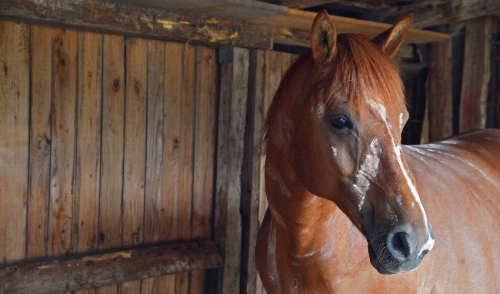{article.name}
Stay Informed
Controlling Horse Stall Odors

- Share this:
- Share on Facebook
- Pin on Pinterest
- Tweet on Twitter
Controlling horse stall odors begins with the building of the stall itself, so take care to consider the materials you choose in stall flooring. For instance, while concrete and asphalt retain little odor (as opposed to wood or materials such as clay or topsoil), they can be hard on your horse’s legs. While this requires more bedding to soften the surface, these materials are generally longer lasting and easy to clean. Consider the pros and cons of each material, with regards to several different variables, including odor retention.
Odors may also be caused by your horse’s diet. Diets high in protein, such as one of alfalfa hay, can lead to strong ammonia scents. If you smell irritating ammonia odors from outside of the horse’s stall, take this as a sign to change your horse’s diet to one less heavy in protein (such as grass hay) and use other supplements to bulk up for nutrients and calories lost from the legume hay diet. If your vet advises you not to make this switch, try keeping the horse in a better-ventilated space or outside as much as possible.
Make sure to muck regularly (once or twice a day), particularly in the areas of the stall where your horse tends to relieve him or herself (you should tend to notice a pattern here, so pay keen attention to those spots). Cleaning the stall more frequently can also save you the time of entirely changing the bedding, which needs to be done, but with much less frequency if you keep each stall neat.
You may also want to use commercial products to deodorize and dry out bedding. Many horse-owners are successful using unscented kitty litter as a means of drying out the stall. A pound of generic clay-based litter can cost as little as twenty cents a day, and can be mixed with barn or garden lime to help eliminate odors simultaneously. These products may irritate your horse, however, so be sure to put ample bedding on top of where you sprinkle this mixture.
Controlling horse stall odors is not only important in keeping a tidy and pleasant barn; odors can also directly impact the health of your horse. Leaving bedding soaked in ammonia from your horse’s defecation can damage the lining of their respiratory system and lead to illnesses such as heaves or RAO. This is especially true in foals or horses that lay down more frequently. A heavy ammonia scent should be taken quite seriously and should signal the need to make an immediate change in your daily barn routine, from mucking to feeding. Be patient in trying to find the combination of products and techniques that work best for you, your barn and your horse, but keep in mind that the safety of your animal is at stake!
Special Offers
We are constantly adding new specials to our site. Be sure to check back often!




Comments